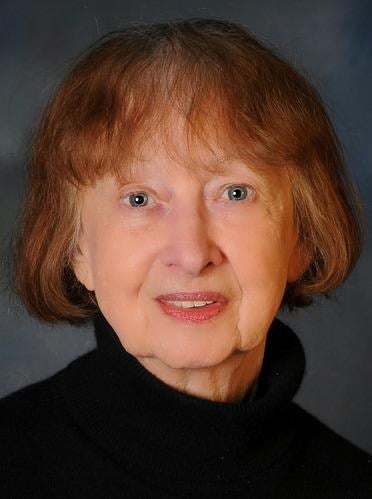
Angeline Kearns-Blain, who taught sociology and women’s studies at Boise State, died in June in Boise at the age of 84. A celebration of her life will take place at 11 a.m. on Sunday, Aug. 27 at the Idaho Anne Frank Human Rights Memorial, 770 S. 8th St. in Boise.
Kearns-Blain, born in a housing project in Dublin, Ireland, wrote about her impoverished childhood in an acclaimed memoir, “Stealing Sunlight: Growing up in Irishtown” (2000). A second memoir, “I Used to be Irish: Leaving Ireland, Becoming American” (2009), told the story of her immigration to the U.S. in the 1950s. Newly married to an American GI, she left Ireland at the age of 18 with $2 in her pocket. She and her family eventually ended up in Idaho Falls, Idaho, when her husband got a job at the Idaho National Engineering Laboratory.
At age 38, Kearns-Blain began pursuing her academic career. Having left school in Ireland at age 13 to help support her family, she got her GED and enrolled at Idaho State University. There she met Michael Blain, the sociology professor who would become her second husband. They moved to Boise where Michael Blain accepted a teaching position at Boise State. Kearns-Blain earned an undergraduate and master’s degree in sociology at the university. She taught as adjunct faculty in the 1980s and 1990s.
Friends and family say that Kearns-Blain was a passionate proponent of social and environmental justice and the rights of refugees. Before Michael Blain’s death in 2020, the couple devoted their time and energy to peace activism. Kearns-Blain wrote additional pieces on subjects ranging from the Boise Peace Quilt project to Basque dancing.
History Professor Emerita Lynn Lubamersky, a friend of Kearns-Blain, said, “One of the things that was really important to Angie was to help students and younger women become aware that they have just as much right to happiness, to safety, to security and to everything that is good in the world as men do. You can see this in the title of her first memoir. She grew up in bleak poverty in the slums of Dublin in a place where girls had to earn their keep and were not entitled to think of their own happiness first. If they did, they were cheeky and were told that they were ‘stealing sunlight.’ She had to go to work before she could get her high school diploma, just like the other working class girls in the place where she grew up. But despite all of this, Angie found her voice, and she knew how to use it. “She was committed to telling her life’s story since she wanted to speak not just for herself, but for all the other Irish working-class girls who were never able to tell theirs.”
Kearns-Blain worked with Boise State faculty to establish the Boise State University Women’s Center and taught the Introduction to Women’s Studies course in the sociology department. Kearns-Blain and others “were committed to consciousness raising and women’s liberation,” Lubamersky said, even when that was at odds with mainstream society. “Angie was an activist, a storyteller, a teacher and a friend. The world lost a great spirit when it lost Angie.”
History Professor Emeritus Todd Shallat recalled Kearns-Blain’s time on campus. “The Angie I knew was one of the university’s first public history graduate students, and she took that lesson to heart. Southwest Idaho became her case study of ethnically grounded feminism and informal networks of power. Writings on quilting, music and dance celebrated and sought to preserve folk-art traditions. Two fine books recalled her native Ireland and childhood trauma. Passionate, wry, often hilarious and always authentic, she connected Idaho to global cultural movements, helping Boiseans understand both.”
Donations can be made to the Wassmuth Center for Human Rights in memory of Kearns-Blain. Plans are in the works to install an engraving at the Anne Frank Memorial to honor her and Michael Blain.